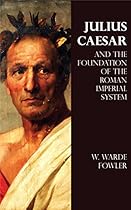Julius Caesar and the Foundation of the Roman Imperial System (Illustrated)

| Author | : | |
| Rating | : | 4.96 (639 Votes) |
| Asin | : | B014GOET4I |
| Format Type | : | |
| Number of Pages | : | 168 Pages |
| Publish Date | : | 2015-07-24 |
| Language | : | English |
DESCRIPTION:
She has taught at York University and is the author of a number of books, including "In a Gilded Cage, "Below the Peacock Fan, "The Embroidered Tent, "Blenheim and "The Way She Looks Tonight. in English literature from the University of Toronto and was the recipient of the Canadian Biography Award. She lives in Toronto. About the Author Marian Fowler holds a Ph.D.
She has taught at York University and is the author of a number of books, including "In a Gilded Cage, "Below the Peacock Fan, "The Embroidered Tent, "Blenheim and "The Way She Looks Tonight. in English literature from the University of Toronto and was the recipient of the Canadian Biography Award. Marian Fowler holds a Ph.D. She live
CÆSAR DID NOT STAY LONG in Rome to risk the Dictator’s wrath a second time; and he was indeed now old enough to serve his first campaign, a duty still obligatory on all young men of his age. It was an important part of the military education of a young Roman of high birth, that he should serve his first campaign under the immediate eye of a commander-in-chief, living with him in his tent as a kind of page or youthful aide-de-camp, and learning from him the traditions of the arts of warfare and provincial government. The war with Mithridates, the formidable enemy whom Sulla had driven to a doubtful peace, had broken out afresh the year before, and was still smouldering; and there was always plenty to do on the Asiatic coasts, for the pirates of Cilicia were hovering round every port, and as yet entirely unbridled. But we know that at the siege of Mytilene, the last town that held out for Mithridates, he bestowed on his pupil the “ civic crown “ for saving the life of a fellow-soldier; and thus Caesar began his military career under no imputation of effeminacy, such as was invented for him in later times. As Sulla’s legatus it is
"outdated yet informative" according to history student @ LSU. I read this book as a requirement for my Roman History class. Although I enjoyed it, most of the political references the author makes are analogies to the political climate of Britain and could be omitted without detracting from the otherwise well-written and well-researched book. The footnotes are leave something to be desired, and unless the reader has knowledge of Latin or Greek, the author's context is not enough to understand some passages.Overall, it is an excellent but at times boring read. Given the time period (1892), it is fortunate that Fowler takes such a comprehensive approach to the study of Julius Caesar. The chapt
